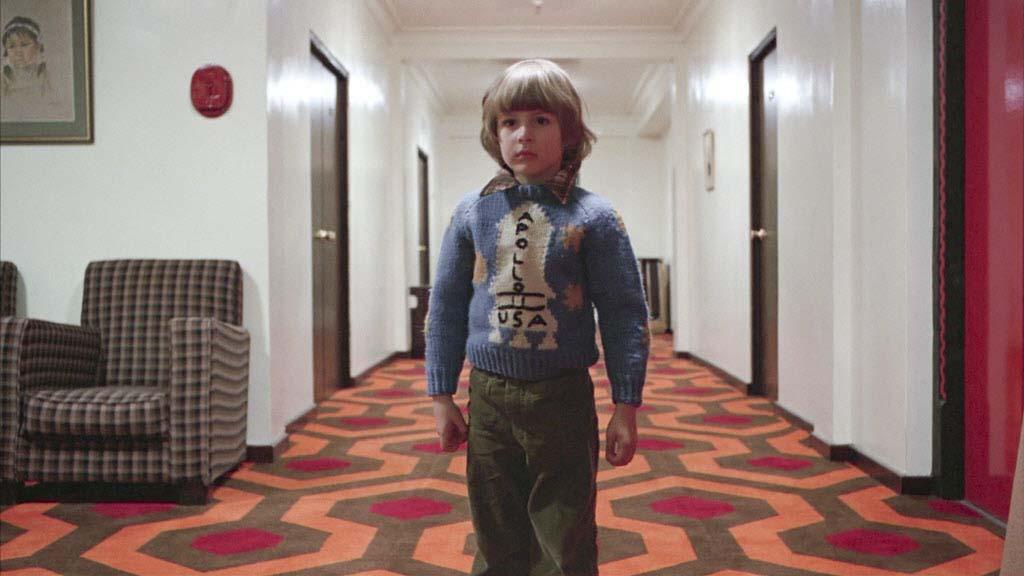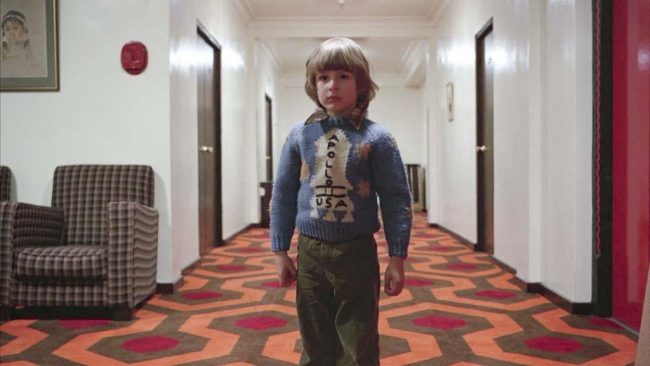
Danny Lloyd plays the son of Jack Nicholson and Shelley Duvall in the 1980 horror film “The Shining.” (Courtesy of Warner Bros. Pictures)
Like a growing number of film projects in these hyper-connected times, Rodney Ascher’s “Room 237,” – which examines the many conspiracy theories surrounding Stanley Kubrick’s “The Shining,” began when his friend, and eventual producer, Tim Kirk shared a short YouTube video pertaining to the film’s subject over email.
Since its release, “The Shining” has been rooted in controversy and conspiracy.
Initially, the public had problems digesting the film’s extreme, graphic narrative, however, as the film lived on in the public realm, a growing group of viewers started to dissect Kubrick’s masterpiece and attribute meanings to the film ranging from the staging of America’s moon landing and the persecution of Native Americans.
These weren’t your everyday conspiracy theorist.
No, these guys meant business.
Ascher believes that the advent of the Internet turned a smoldering interest into a full-on wildfire.
“These conspiracy theorists were always out there,” Ascher said.
“But when the Internet came around, that’s when it really blew up. The Internet opens up a window for people to share their ideas. There is no way this project would have come together without the Internet.”
Soon after Kirk’s video-share, Ascher became obsessed with “The Shining” as well; he even claims to have developed an “Internet addiction” while prepping for the documentary.
“Tim and I spent a year research as much as we could about the theories surrounding ‘The Shining,'” Ascher said.
“Our minds were blown with the things people were putting out there.”
With a background rooted in film, Ascher decided to tackle the subject full on and adapt some of the movement’s most extreme ideas into a documentary. Thus, “Room 237” was born.
“It’s amazing to me that even after 30 years since the film’s release, people are still so passionate about it,” Ascher said.
“To get the project going, I just started calling different people and asking for an interview. Everyone was willing, if not excited, to explain their take on ‘The Shining.'”
Ultimately, Ascher condensed his documentary to just five very passionate, headstrong subjects, each with their own theory on what “The Shining” really means.
Between the subjects’ interviews, Ashcer laces crucial scenes of the movie that explain the certain conspiracy theory being discussed.
This required Ascher to view “The Shining” hundreds of times.
“I love [‘The Shining”] and if I didn’t love soaking in it, I wouldn’t be able to make the film,” Ascher said.
“I’m hard pressed to think of another movie that I would have been able to watch as many times as I did ‘The Shining.'”
With the film complete, Ascher and his documentary team took the film to the Sundance Film Festival for its premiere.
Sundance acted as a catalyst for the film as upon its first viewing, a roaring buzz followed.
“It’s like I’ve hit seven consecutive jackpots,” Ascher said.
“Getting accepted into Sundance alone was an honor, but actually hearing that people liked my film was even better.”
Since Sundance, the film has been screened at numerous film festivals and, starting this Friday, will undergo a national release.
This type of exposure, Ascher claims, has lead to even more conspiracy theorist coming out of the woodwork.
Enough so that Ascher believes a sequel could be possible.
“There is certainly enough material out there for a second look at the subject, but right now I’m just excited to repost and discuss new ideas,” Ascher said.
“Projects I’m developing right now aren’t follow ups but maybe I’ll tackle symbolism in another movie.”
Ascher’s “Room 237” opens at the Angelika Dallas this Friday.









